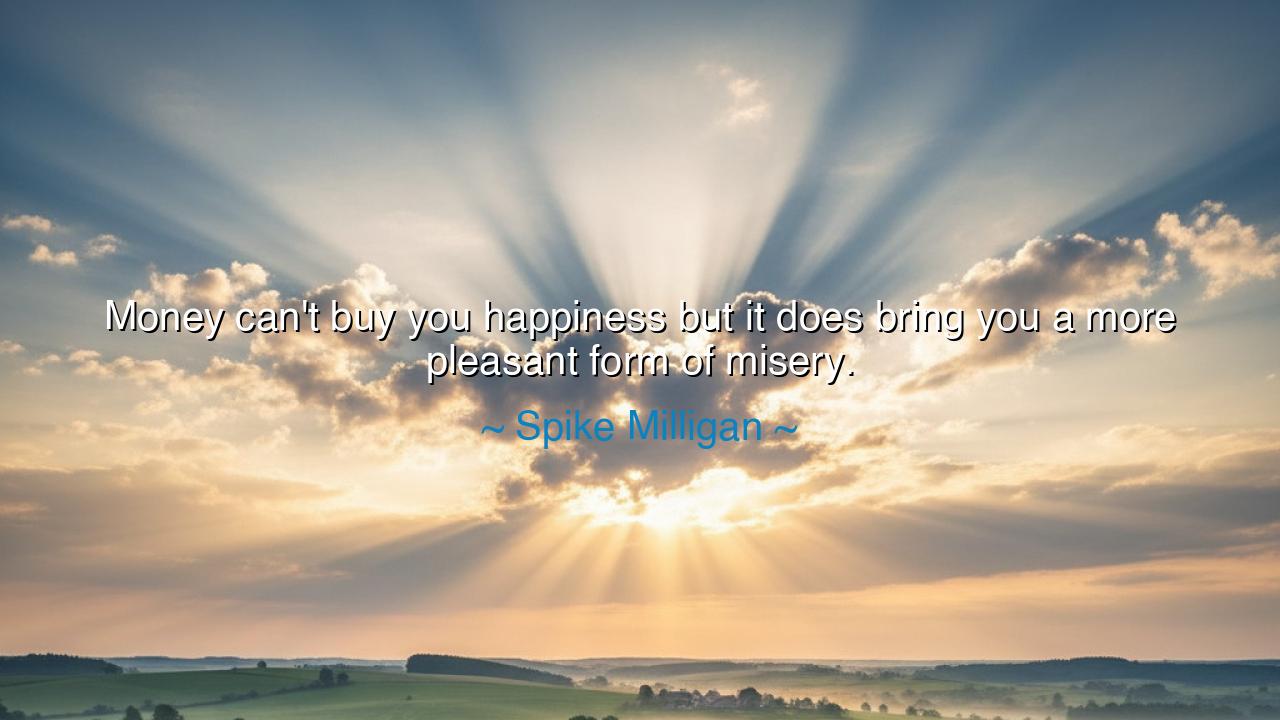
Money can't buy you happiness but it does bring you a more






The brilliant humorist Spike Milligan, whose laughter often cloaked the pain of his own soul, once said: “Money can’t buy you happiness, but it does bring you a more pleasant form of misery.” These words, at first clothed in jest, reveal a truth as ancient as the human heart: that wealth, though it may soften life’s hardships, can never mend the wounds of the spirit. Milligan, a man who lived between genius and melancholy, understood what many fail to see — that money can ease the body’s discomfort but not the mind’s unrest, can furnish the house but not fill the home, can gild the cage but not free the heart within it.
To understand this saying, we must first understand Spike Milligan himself — a man of laughter and sorrow. As one of the great comedic voices of the twentieth century, he brought joy to millions through The Goon Show, inspiring generations of comedians to come. Yet behind the humor lay the shadows of mental illness, despair, and loneliness. Milligan knew the paradox of success: that one may gain fortune and fame, yet feel emptier than before. From this awareness came his bitter wisdom. In his wit, he mocked society’s endless pursuit of wealth as the cure to suffering. He knew that money, while useful, cannot shield a man from the trials of existence — from grief, loss, and the hunger for meaning.
The ancients too understood this eternal truth. The philosopher Epicurus taught that happiness lies not in riches but in simplicity — in friendship, wisdom, and inner peace. The Stoics, like Seneca, warned that wealth can amplify misery if the soul is untrained, for the man who desires much is never content. Milligan’s humor, though modern in form, carries the same essence: that comfort without contentment is still misery, only dressed in finer clothes. To suffer in silk is no different than to suffer in rags — it is merely the texture of the sorrow that changes. The form of misery becomes more pleasant, perhaps, but its substance remains the same.
History gives us countless examples. Consider Howard Hughes, one of the wealthiest men of his time — a visionary who conquered the skies and the silver screen. Yet, despite his fortune, he spent his final years in isolation, consumed by paranoia and fear, his wealth surrounding him like a prison of gold. His story echoes Milligan’s truth: that money can buy comfort, but not peace; distraction, but not purpose. The misery of the rich, though hidden beneath luxury, is often deeper than the misery of the poor, for it carries the bitterness of knowing that even abundance could not fill the emptiness within.
Still, Milligan’s words are not a condemnation of wealth, but a call to wisdom. He does not scorn money itself — for he admits it can make misery “pleasant” — but he warns against mistaking it for happiness. There is no sin in possessing wealth, only in being possessed by it. Money can ease the burdens of hunger and hardship; it can build hospitals, schools, and shelters. Yet without a purpose greater than possession, it becomes hollow. True wealth, as the sages teach, lies in gratitude, in service, and in the cultivation of joy that no currency can purchase.
Happiness, unlike comfort, is a moral achievement. It is born not from what we own, but from how we live — from love given and received, from work that uplifts, from the peace of conscience that cannot be bought or sold. The wise man, whether rich or poor, learns to treat money as a servant, not a master. When used rightly, it becomes a tool of kindness; when worshiped, it becomes a chain of gold around the neck of the soul. Spike Milligan’s jest hides this sacred warning: that wealth can polish life’s surface, but it cannot heal its depths.
So, my child, remember this teaching and carry it close. Do not despise money, but do not depend upon it for joy. Seek first what endures — friendship, wisdom, laughter, and peace of mind. Use what you earn to bless others, and your wealth will multiply in meaning. For if misery must come — as it comes to all — let it be the kind born of compassion and purpose, not of vanity and greed. As Milligan’s wit so gently reminds us, money may grant us a “more pleasant form of misery,” but only love, humility, and truth can turn that misery into happiness.






AAdministratorAdministrator
Welcome, honored guests. Please leave a comment, we will respond soon